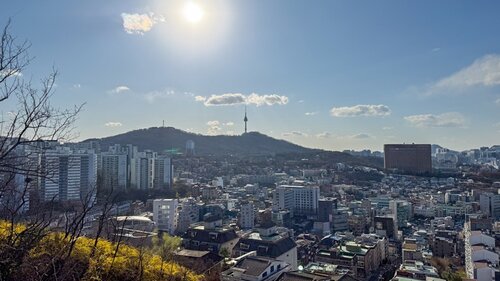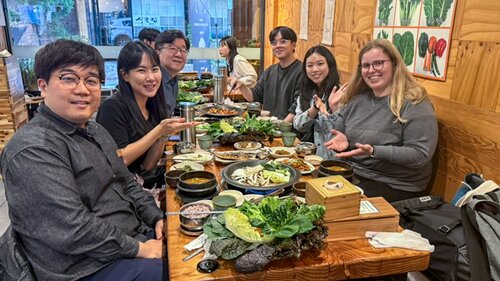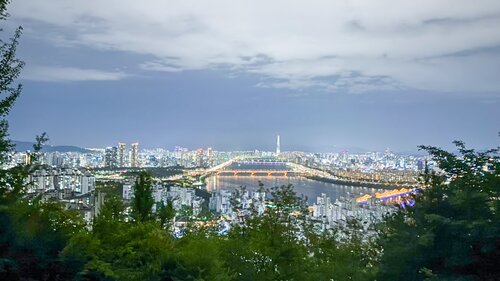Three Months in Seoul: Research, Culture, and New Perspectives
Three Months in Seoul: Research, Culture, and New Perspectives
Hi Carolyn, you spent three months on a research exchange in Korea at Seoul National University. What was your first impression when you arrived?
I had already been on vacation to South Korea three times before my research trip and immediately felt very comfortable. Korea is very safe and people are extremely courteous. Except on the street, where everyone is pretty determined to go their own way, and I had to be careful not to get bumped into (laughs). But I quickly adapted to that.
Why did you decide on a research stay in South Korea?
For a long time, I had no connection to South Korea. Then a friend suggested it as a travel destination during the COVID pandemic. During that time I stumbled across a K-drama on Netflix by chance and met a Korean woman at a conference who I’m now good friends with. That sparked my interest in the culture. Over three years I traveled there three times and started learning Korean – it’s a great language and the writing system is really interesting!
This eventually led to the idea of also conducting scientific work there. Together with my supervisor Katharina Krombholz I thought about what topic would be suitable for collaboration. I came across the work of Professor Joonhwan Lee at Seoul National University, who, together with a former doctoral researcher, investigated how technology can help survivors of sexual violence. That topic closely aligns with the current research interests of both my supervisor and me. I then happened to meet Joonhwan at a CHI conference and that conversation ultimately led to an invitation to come to Seoul.

Before we talk about the research project, I’d like to know how you funded the stay and whether you encountered any hurdles entering the country.
I received a DAAD scholarship for doctoral researchers. The funding depends on the destination country and includes a travel allowance, monthly support, and subsidies for housing and food. At the same time, CISPA was still able to fund me during the research stay because the visit was part of a joint scientific project between CISPA and Seoul National University. Thus, the monthly DAAD stipend was reduced slightly.
The visa situation was a bit obscure at first. It wasn’t immediately clear whether I needed a regular visa or could enter with the K-ETA, South Korea’s equivalent to ESTA. In the end everything worked out smoothly, even without a K-ETA, because it had been suspended for German citizens among others, at the time of my entry. It was only certain that I would be allowed into Korea once I was actually in the country (laughs).
Let’s get to your research: what does your joint project with Joonhwan Lee’s group look like?
Together with a local researcher I developed a study that focuses on safety mechanisms against sexual risks in end-to-end encrypted messengers – specifically for young people. Our goal is to find out which protective measures young people consider necessary and what kinds of support they want.
We focus on phenomena like grooming or sextortion – that is, targeted manipulation or blackmail. Young people without stable social support are particularly vulnerable. But adults also benefit from appropriate safety features. That’s why we are currently focusing on youth while aiming to develop safety mechanisms that work for different age groups.
These problems have been known for a long time. Why is so little still being done?
A central problem is that large tech companies usually implement only the bare minimum – measures that would offer truly effective protection are often missing. At the same time, it’s hard to strike the right balance between protection and individual freedom.
A major motivation for the joint research project with Korea was precisely this: in Germany there’s a strong sensitivity around data protection and privacy. In South Korea people are more willing to experiment, and attitudes toward sexuality are different. Those cultural contrasts make it interesting to develop protection concepts that work in both contexts.
Unfortunately, there’s very little publicly available research so far—much of it stays inside companies. That makes international collaboration at an early stage even more important. Our goal is to collect and analyze data through a German-Korean user study and use these findings to derive effective protective mechanisms.

Carolyn (first from the right) having dinner with Professor Joonhwan Lee’s research group (with Professor Lee third from the left).
What surprised you most in everyday life in Korea – maybe even culturally?
The warmth and helpfulness of the people. I had a lot of interesting conversations about culture and expectations of society and the individual. That was very rewarding.
How was the collaboration with your Korean colleagues? Were there surprising similarities or things that worked very differently?
Actually, collaboration was similar to here. I’m used to working very independently under the supervision of Katharina, and it was the same in Seoul. We started and only turned to Joonhwan when we couldn’t move forward. In the end, we did have several meetings with him. I had heard that people in Korea come to work early and leave late, but in my group we were able to organize our working hours the way we needed.
It was interesting how different the research focuses are: while at CISPA we mostly work in usable security and privacy, Joonhwan’s group focuses on human–computer interaction, AI, and even artistic projects – for example, dance combined with AI. The backgrounds of my Korean research colleagues were really helpful, especially on design questions, and I gained many new perspectives. Joonhwan’s lab is very interactive and interdisciplinary—it includes not just computer scientists but people with very diverse backgrounds.
Would you recommend an exchange like this as a career-building step for early-career researchers—and if so, at what stage of the PhD?
Definitely. If it’s financially and logistically feasible, everyone should do this kind of international experience in academia. Three months is manageable – long enough for a joint research project, but short enough to keep your apartment back home, which lowers the barrier. And such stays strengthen not only your own research but also institutional cooperation.
I’m in the final year of my PhD and found the timing ideal. At the beginning, it might have been more difficult to set up my own project. But basically, it’s a rewarding experience at any stage.
